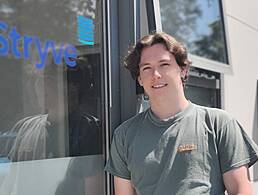Priyanka Lingegowda discusses her role as a principal software engineer at Liberty IT and her role as chair of Women in Tech at the company.
For Priyanka Lingegowda, the most enjoyable qualities of working in engineering are the continuous learning and improvement opportunities that the career provides.
Lingegowda is a principal software engineer at Liberty IT and has worked at the company since 2010, when she joined as a senior engineer after relocating from India.
For Lingegowda, challenging projects are not an annoyance. She instead views them as an opportunity for her to apply her problem-solving skills on a daily basis.
‘If you are interested in working in engineering, understand the landscape and find out what kind of jobs are out there’
If there is such a thing, can you describe a typical day in the job?
I recently changed to compressed hours, which means I work additional hours most days and take a Monday off every other week. I have chosen to work hybrid, which means I am in the office one day a week and work from home the rest of the week. This helps maintain a good work-life balance where I use additional days off for some me time and selfcare and have weekends for quality family time.
I usually start my work at 8.15am and start by checking and replying to my emails and Teams chats. I then tidy up any unfinished tasks from the previous day to provide an update during our team stand-up. At 10.30am we have a sync-up meeting for a quick team catch-up to raise any blockers and discuss progress made and some weather talk. I then continue to work on my tasks until lunch time.
I take lunch at 12.30pm and, weather permitting, take a quick stroll. I aim to go to the office on the same day as my other team members who I like to catch-up with during my lunch. Then it’s back to work and I attend meetings with our US counterparts.
No day goes without a coffee break and when I’m working from home, it doubles up as a quick hello and hug with my two sons when they get home from school. Before finishing up for the day, I catch up with my team to discuss the progress made at work and plan for the next day.
What types of engineering projects do you work on?
I have worked at Liberty IT for 12 years and in this time, I’ve worked on various projects, most recently leading a team to develop one of our first cloud data warehouse systems. I really enjoyed learning new cloud programming skillsets and solving the challenges it created as we were one of the first teams to drill into this and we learned a lot along the way.
This project enhanced my leadership skills as I was at the forefront leading the team and the key customer contact. I am also responsible for coaching and mentoring my team.
Currently, I am working in the innovation space on MLOps (machine learning operations) projects with our data science team to build and productionise machine learning models. This has been a great opportunity for me to learn about ML models and to work with very talented and senior technical leaders and architects across Liberty IT, which is enhancing my tech expertise.
What engineering skills do you use on a daily basis?
I started my career as a .Net engineer and used a Microsoft skillset earlier in my career – Asp.net, C# and SQL to name a few.
As we moved towards cloud computing, I had to learn and develop cloud computing skillsets. Now I mostly work on AWS cloud platform and use CDK software development framework for development.
Some key programming skills I use daily are Python, Typescript along with SQL, XML and other languages. I also use database management skills such as SQL.
Testing and debugging skills are very important along with monitoring and logging tools such as Splunk and Datadog. I use GitHub for my version control. Jira and Trello are some of the agile tools which I use on daily basis.
In addition to technical skills, as a principal engineer, it’s important for me to use leaderships/soft skills such as communication, teamwork and problem-solving abilities and communicating feedback. These skills are very important to help me collaborate with other team members and communicate technical concepts to stakeholders.
Last but not least, Slack and Microsoft Teams are both very important in my daily life for communication and collaborations.
What advice would you give to someone who wants to work in engineering?
If you are interested in working in engineering, understand the landscape and find out what kind of jobs are out there.
Follow your interest and learn the relevant tech skills and gain experience wherever you can. Online learning marketplace resources such as Udemy and Pluralsight have thousands of courses to train and help prepare for a range of certificates.
Securing an internship is a great way of gaining hands-on experience and networking is an important process to build professional contacts. As well as online networking like LinkedIn, attending events, conferences and local meetups are a great way to build professional contacts, which in turn can get you access to job opportunities that may not always be advertised.
Tell me about your role as chair of the Women in Tech ERG and what it entails.
My role as a chair of Women in Tech at Liberty IT is to act as the main spokesperson for the group by promoting the initiatives within the company, overseeing the planning and events and identifying opportunities for initiatives and collaboration. At Women in Tech, we are focused on creating connections and networks, offering training and mentorship, hosting engaging panel discussions and key events to provide opportunities for women to amplify their voice and grow their career. We work on the recruitment and retention of female employees, on encouraging women to consider and pursue a career in technology, and aim to close the gender gap in tech through local partnerships and community engagements.
Women in Tech runs multiple programmes and events throughout the year including networking events, coaching circles and the Maternity Returners Buddy Scheme, which provides support and advice to women when they are on maternity leave and to keep them in the loop and aware of any changes in the office during the return-to-work phase.
What do you think are the biggest barriers or challenges facing women in tech?
Women in the tech industry feel that there is a lack of role models, especially in the technical leadership area. This lack of representation can lead to feelings of fewer opportunity for advancement and a lack of mentors.
Another barrier is the lack of family-friendly policies. Women are still often the primary care givers in many families and a lack of work-life balance will ultimately lead to more women leaving jobs.
What do you think needs to be done to ensure the tech industry attracts and retains women?
Diversity and inclusion play a key role in attracting and retaining women in the tech industry, which forms part of our culture already at Liberty IT.
Building a support network in the workplace for the growth of talent and career progression also plays a key role. Consider running inclusive networking events and mentoring programmes aimed at supporting women to fulfil their career ambitions, offering mentorship and safe spaces to have honest conversations and build a community.
10 things you need to know direct to your inbox every weekday. Sign up for the Daily Brief, Silicon Republic’s digest of essential sci-tech news.




